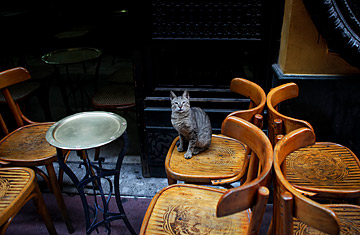
A cat sits on a chair at a coffee shop frequented by tourists, in the Khan el-Khalili bazaar in Old Cairo
Trying to reach Cairo's Tahrir Square through clouds of tear gas and volleys of rubber bullets, Egyptian TV anchor Mona Khalil was forced by the tumult into a side street. There, she remembers, "I saw cats running, running, running and trying to get into houses or staircases or buildings, and some of them were really gasping." Two kittens had found shelter under a car. She managed to take them inside a building, away from the toxic fumes. Others were not so lucky. "Going back later I found two cats that were lying on their sides, dead," she adds. For Khalil, 43, who is one of the leaders of Egypt's fledgling animal-rights movement, the incident had particular resonance. It was, she said, "the first slap in the face that, oh my God, those streets are filled with cats and dogs."
While the world has focused on the many troubles faced by humans during the 18-day uprising, the four-legged residents of Cairo have been left to fend for themselves. Many Egyptians, expats and tourists have been forced by authorities to flee the country without their pets; zoos and pet shops were also abandoned. The chaos of the uprising put a tremendous strain on the nation's largest animal-rights organization, the Egyptian Society for Mercy to Animals (ESMA), for which Khalil serves as treasurer. "It's very common to see stray cats and dogs on the street, but not for us to see [abandoned] Persians and Siamese," she says.
"This is a very brave group of Egyptians that are really forging a new path," says Chicago-based Kristen Stilt, the only non-Egyptian board member of ESMA. "They want a better future for their country, and they think that just like in [other] countries, animal welfare is an important issue." Stilt, who has a Ph.D. in Islamic legal history from Harvard and teaches law and history at Northwestern, explains that ESMA and organizations like it face an uphill battle because of Egypt's troubling cultural attitudes toward animals. The group was founded in 2007 in response to a spree of shootings of stray dogs carried out by the Egyptian government, a brutal method of population control.
Although Islam prescribes strong protections for animals, Stilt wrote in her book Animal Welfare in Islamic Law that "it has become normal to see young boys running after a small dog or pitiful cat and throwing rocks at the poor creature, or tying up the puppy and dragging him by the rope." She continued, "They may even continue with this torture until they kill the animal. It is even more common to see an emaciated donkey (or mule or horse) pulling a heavy cart through the streets of Cairo, and the driver of the cart has whipped the donkey so badly that he has bleeding sores."
American writer Gwen Cooper, author of the best-selling Homer's Odyssey, a memoir about her blind cat, says she was tipped off about ESMA by an Egyptian fan on Homer's busy Facebook page. She contacted the organization and immediately decided to enlist other animal lovers to help. "There are people who have been forced to abandon their pets in all the turmoil," she says. "People who don't care about animals at all may not get it. But people who do understand that it's like having to leave a family member behind." She should know. Cooper was living blocks from Ground Zero on September 11, 2001, and her cats were trapped alone for days. Since she has been writing about ESMA and the Egyptian animal situation on Homer's Facebook and Twitter pages (he has 20,000 friends and followers), she says, "I've gotten hundreds of responses from people who have made donations, who are helping to spread the word themselves and posting it on their own Facebook pages or retweeting it."
So much of what Westerners know about Egypt is animal related, from riding camels around the Pyramids to studying the worship of cats in Pharaonic times. The recent political turmoil has revealed many deep-rooted, previously overlooked problems in that country, the plight of its animals not the least among them. "A couple of people have asked me why they should care about animals all the way in Egypt," says Cooper. "My response has been to say that animals aren't citizens of countries. They're citizens of our hearts, and our hearts have no borders."
